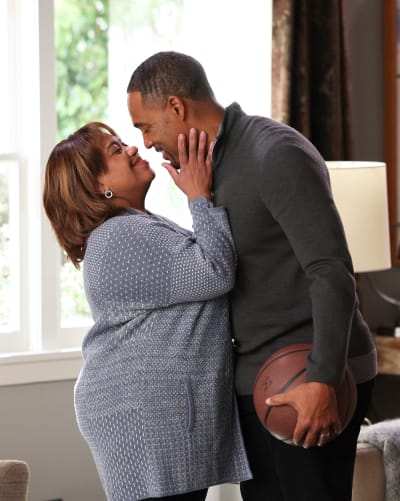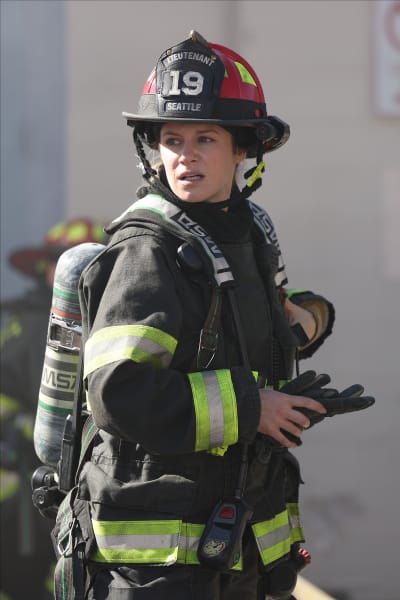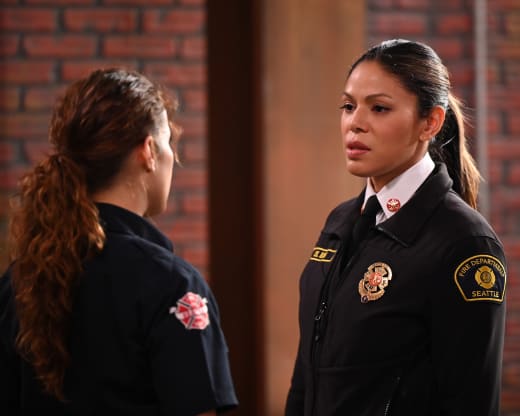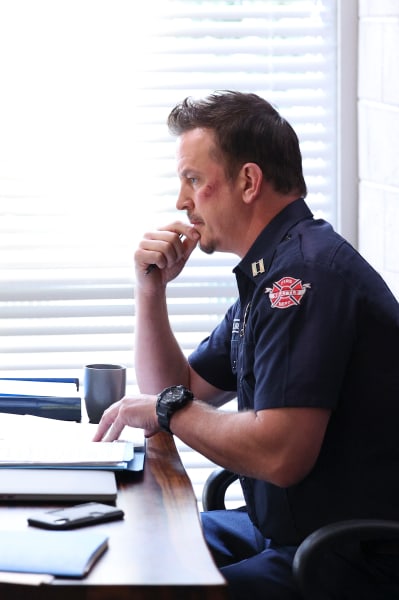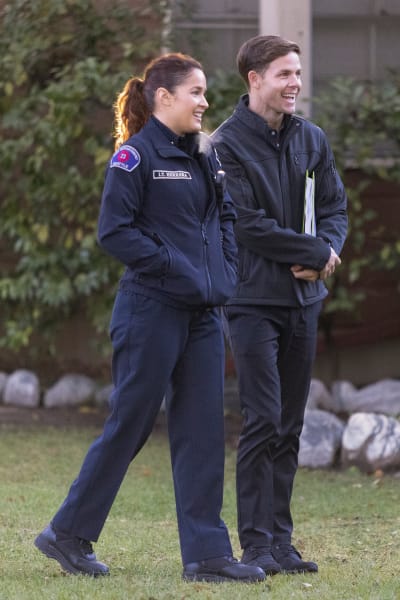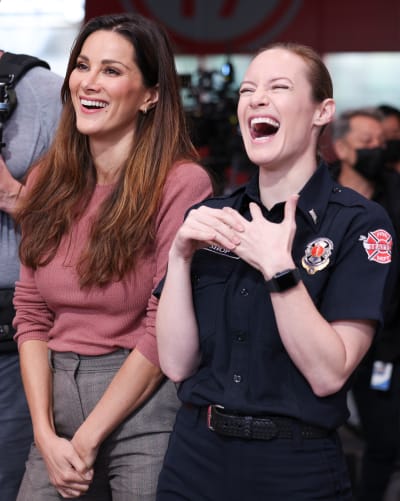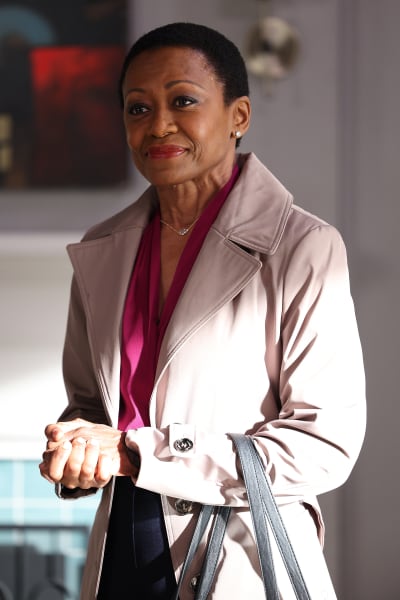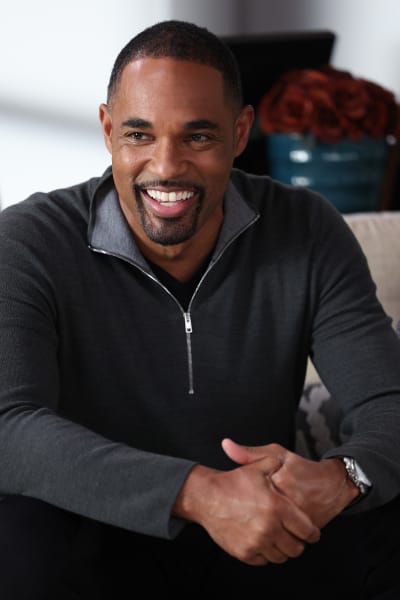Can we please resolve the Beckett situation before he gets himself or someone else killed?!
The Beckett debacle on Station 19 Season 5 Episode 13 made their latest emergency call stressful, and it also highlighted the sexism that Maya faces compared to her colleagues and peers.
The hour also marked the end of Station 23 and the custody battle between Bailey and Warren and Dean's parents.
We've been waiting for so long for some movement or something akin to closure with Maya's quest to become captain again, and they delivered it in on fell swoop, crushing Maya's hopes in the blink of an eye.
From pep talks to Sullivan cheering her on, she thought she'd have a nice sit down with Ross, and she could make her case against the demotion, but Ross got straight to the point.
It's not not my fault that 23 got shut down.
Andy
Ross is a former Marine, so she has a strict sense of duty and following orders. The notion that Maya got into this position that few women are in and chose insubordination doesn't sit well with Ross.
She doesn't care about why Maya did what she did, saving a life against the orders of her superior, or standing up against the man's inherent bigotry. In Ross' mind, Maya's demotion was one that's well-deserved.
We still don't know enough about Ross to understand if this is her true thought process or if she's working ulterior motives. She's hard to read that way, and the flashbacks of her and Sullivan's time in the military didn't do much to fill in some of the blanks with her character.
They showed us how focused and driven she is, and we saw how their relationship developed. It also gave us an inkling as to where Sullivan's PSTD stems. My heart broke for him when he had to take that shot and kill the man in front of his children.
Sullivan and Ross have chemistry and history, but they're still shrouded in uncertainty. It also feels like there is still something below the surface whenever he and Andy interact with each other.
But back to Ross and Maya.
Maya has done some things in her tenure as captain and she has earned some consequences for them. She's not a perfect person by any means, and she's had her moments. But she's not wrong about the double standards that she faces compared to others.
We've seen it with Jack and Sullivan. And we're definitely getting a glimpse of that with Beckett.
Beckett is unraveling before our eyes, and he's consistently putting the team at risk, and it's shocking that Sullivan is the only one who is noticing this, and he spent this much time giving the man the benefit of the doubt instead of telling Ross the truth right out of the gate.
Their job isn't something where you can afford to give someone the benefit of the doubt. If he had alcohol in his cabinet at work, and he's hungover while there, that's reason enough to expect the worst and be concerned.
The candy factory was a prime example of Beckett jeopardizing his team and the people they were there to save. He got the map wrong and sent them in the wrong way, and they wasted precious time there. They weren't even in the right spot to save the pregnant woman.
The call could've gone wrong a dozen different ways because of Beckett's error. We saw how dangerous it was when Duval and Andy's boots were melting on the floor, and they had to tear themselves away from their initial mission to tend to the woman.
A candy factor like that was a certified powder keg.
Beckett is so resistant to any form of help, too, and he hasn't taken the hand that Sullivans has lent him. You have someone like Maya, a good, capable captain who had to essentially do Beckett's job in the field.
We have Andy, whose arc at Station 23 has primed her for the role of Station 19's captain, too. And that's where this will head, yes? Now that the other station is shutting down, Andy will probably get the role, which will be another blow to Maya.
In many ways, it feels like they've been more consistent in showing that Andy is ready for this than they have in addressing how Maya got screwed, and that's unfortunate.
But it's no doubt that Andy will return to Station 19, and she'll get the coveted spot if Ross acts accordingly and releases Beckett. I wonder who else will accompany her there? Hopefully, Theo, but do you see anyone else?
Vic lamented the idea of working alongside Theo at the same station because she knows it never ends well. She's not exactly wrong about that, but they've been through hell and back as a couple. By now, I'm confident that they're in an idealistic place and can manage.
The abortion has brought the two of them together, and it's the first time in a while that Vic seems genuinely happy. Hell, they started as a pairing that warranted a level of indifference, and now, they're probably one of the strongest ones there. It's remarkable growth for them.
One thing is for sure; they aren't together out of some fear of being alone, so they're nothing like poor Alan who died in his apartment without anyone noticing an eternity later.
Can we just pretend like all that never happened? I forgive you. I really, really forgive you.
Emmett
From that experience, Travis concluded that his issue is that he doesn't want to be alone, and that's what he's been avoiding while with Emmett. He also had the epiphany that he's never been in love with Emmett, he only wanted to avoid loneliness, and that his behavior makes him exactly like his father.
I'm glad that Travis is having these freaking epiphanies in his free time while working cases, but unless he goes to gosh damn therapy or something to unpack all of this further and actively do something about it, he can miss me with all of this.
The merry-go-round with this man who tricks himself, his boyfriends, and viewers into thinking he's capable of loving another person and moving on from Michael only to pull the rug from beneath our feet has gotten old. The message that he's incapable or somehow allergic to happiness is unhealthy.
It's such a disappointing development in that there is none for him at all based on this arc. When does Travis grow and evolve? When does he make some headway in his personal life?
Why is he frustratingly stagnant and perpetually broken? If one didn't know any better, they'd consider him the Meredith Grey of Station 19, but hell, even she isn't that bad and we at least saw her era of real love and some growth amid her dark and twistiness.
Travis had this grand epiphany, but Emmett, once again putting himself out there, coming to Travis, showed up at his doorstep to extend his forgiveness because Emmett likely genuinely loves Travis and/or he doesn't want to be alone either.
Emmett deserves so much better than this, and it sucks that Travis has become this unlikable because of his treatment of Emmett.
Meanwhile, things don't always look the prettiest with Carina and Maya, but at least there are marks of growth.
Carina is a kind, loving, supportive soul. They're beautiful attributes of hers, but Maya is a bit darker, and sometimes she requires different things.
Carina's love language is damn near all of them, words of affirmation, acts of service, gifts -- she does the works when she's showing Maya how much she loves and supports her. But to someone like Maya, it can be suffocating, and sometimes you need to sit in your anger and devastation for a bit before you focus on the positivity.
Fortunately, Maya is at a place where she can communicate her needs to Carina in a way that doesn't attack Carina or come across as her closing herself off or pulling away.
She isn't running away from her or shutting her out right now. She's taking her moment, and she reassured Carina that it's not a reflection on their relationship or future. And thankfully, Carina received that.
Even with Marina and Vic and Theo, Ben and Miranda remain the most solid couple of them all.
Similar to how they ripped the band-aid off with Maya's investigation leading nowhere, we got an unexpected end to the custody battle with the Millers.
Did anyone anticipate them giving Pru over because of health reasons?
They're such a stubborn pair, that you'd have expected them to rely on nannies or enlist the help of Dean's sister or some other family rather than turn Pru over to Ben and Bailey.
They still tried it, though. The stipulation that they wanted all of the holidays and some of the summer was excessive, and they should've known that Bailey would flip out over that.
After that long process, I'm not sure I would've fought them on it. Sure, offering to spend the holidays together is the most sensible, but if they got her for the rest of the year, they could've managed without the holidays.
Bailey is ruthless when she's fighting for hers, so her putting them on blast and implying that she knew someone was sick and she'd take it to the judge was within the realm of something she'd do.
But her compassion and her instinct as a healer kicked in too, so it's pleasing that she's arranging for Mrs. Miller to consult with Maggie about her heart condition.
She should be with you. It's what's best for her.
Mrs. Miller
And they still left things out there in the open when Mrs. Miller insisted that Ben's job was too dangerous and implied that he needs to quit it if he wants Pru.
Over to you, Station 19 Fanatics. Are you devastated for Maya? Do you think Andy will get Captain at Station 19? Are you happy the custody battle is over? Hit the comments!
You can watch Station 19 online here via TV Fanatic.
source
https://www.tvfanatic.com/2022/03/station-19-season-5-episode-13-review-cold-blue-steel-and-sweet/
